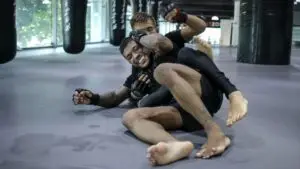Anxiety is more than just being stressed out. It’s a constant sense of worry, fear, or unease that can make it hard to sleep, get things done, and enjoy life in general. More and more people are turning to combat sports as a peculiar but powerful way to feel better, even though established treatments like therapy and medicine can work quite well. Training in boxing, Brazilian Jiu-Jitsu (BJJ), Muay Thai, or mixed martial arts is good for more than just being in shape. These sports establish controlled, disciplined settings where mental focus, emotional control, and physical intensity all come together. The combination of these factors can change the lives of people who are dealing with anxiety.
TL;DR
-
Combat sports reduce anxiety by combining physical exertion with mental focus, helping reset stress hormones and promote emotional regulation.
-
Training builds confidence, resilience, and structure which are key components in managing anxious thought patterns.
-
The community, routine, and controlled exposure to pressure create a safe space to challenge fears and grow stronger mentally.
The Link Between Physical Movement and Mental Health
To fully understand the influence of combat sports on anxiety, it is essential to examine the neurology of movement and mood. Endorphins, which are chemicals that make us feel better, are released when we exercise. But that’s not all. Exercise also raises levels of serotonin and dopamine, two neurotransmitters that are very important for keeping your mood stable, your motivation high, and your emotions stable.
Also, moving around regularly lowers cortisol, which is the body’s major stress hormone. People who have persistent anxiety generally have high levels of this hormone. Over time, physical training helps the brain’s neuroplasticity, which is its ability to remodel itself. This means that you can steadily replace anxious thought patterns with healthier, more stable ones. There are various sorts of exercise that can help with these benefits, but combat sports are different because they mix physical activity with intellectual challenge, mental stimulation, and real-world problem solving.
Why Combat Sports Are Different from Regular Workouts
Not every workout is the same. Combat sports are different because they need more than just strength and stamina. They require you to stay focused, control your emotions, and be able to think rationally when things get tough.
- Sparring or grappling pushes you to make quick, strategic choices when you are addressing problems in real time. Every session of combat training has its own character, unlike working out at the gym over and over again. You have to watch what your opponent does, change your plans on the spot, and apply your strategies right away. This teaches your brain to stay calm and present, which is the opposite of the overthinking and spiraling thoughts that are common in anxiety.
- Combat sports put people in dangerous circumstances in a safe way by exposing them to adrenaline. You learn how to control the “fight or flight” reflex that often makes you anxious. Your body quits overreacting to everyday pressures as you get better at handling stress.
- Skill development gives people more power. Each accomplishment, whether it’s learning a new skill, getting a belt, or doing good in sparring, makes you believe in yourself more. For people with anxiety, gaining this sense of personal control is very helpful.
Structured Routine Fights Chaotic Thoughts
Anxiety thrives in disorder. It feeds off unpredictability and the feeling of being ungrounded. Combat sports offer structure in a way that creates calm and stability. Classes are scheduled, warm-ups are consistent, and techniques are practiced repetitively. This predictability helps soothe the anxious mind by providing a routine and sense of order.
Also, having a goal, like going to training three times a week or getting ready for a belt test, helps you focus your energy on making progress instead of worrying. Going to class even when you don’t want to trains you to act based on discipline instead of feelings. This stops the cycle of avoidance, which is one of the worst things that anxiety can do.
Controlled Aggression as Emotional Release
Anxiety typically comes with anger, annoyance, or irritability that is held back. Combat sports are a socially acceptable and useful way to deal with these feelings. You can let off all that extra energy by hitting pads, rolling on the mat, or doing controlled sparring.
This isn’t about violence; it’s about expressing yourself. A lot of people say they feel “lighter” emotionally after working out. When you do rigorous drills, your mind stops thinking about things that make you anxious and starts thinking on what you need to do. Being able to channel anger without guilt or fear gives you a sense of clarity that is challenging to obtain in regular life.

Mindfulness in Motion
Mindfulness can be achieved in other ways besides meditation. You have to be very focused when you do combat sports. When you are practicing or sparring, you can’t think about the future or the past. You are completely there, reading the other person, adjusting your technique, and breathing on purpose.
This “flow” state teaches your prefrontal cortex, which is the area of your brain that makes decisions, to stay online even when things get tough. The amygdala, which is the part of the brain that controls fear, starts to calm down. This change in the brain makes things calmer over time and makes emotions more stable.
Evidence-Based Insight: Martial Arts and Anxiety Reduction
There is scientific evidence to support what many people who do combat sports have said for a long time. BMC Psychology published a controlled, randomized trial in 2019 that looked at how martial arts training affected the mental health of high school students. The study indicated that students who took part in an organized martial arts program were more emotionally stable, had less anxiety symptoms, and had fewer behavioral problems than students who were not in the program.
Standardized psychological tests were used to measure these results, which gives the findings actual credibility. The advantages were significant and lasted beyond the training session. Students said they kept using important skills like controlling their breathing, moving with purpose, and controlling their emotions long after the workshop was over.
The study shows that martial arts training can be a very helpful addition to regular mental health care. By teaching young people to manage stress through physical discipline and mental focus, martial arts helped build lasting emotional resilience, an outcome equally relevant for adults dealing with anxiety.
Is Combat Training Right for You?
Combat sports won’t make your anxiety disappear right away. But for a lot of people, they are a strong force for change. If you have anxiety and want to get your life back on track, learning martial arts can be the tool and relief you need.
Combat training is a complete way to build self-confidence and emotional balance via physical intensity, mental focus, and community support. You won’t just feel better; you’ll also be stronger, more grounded, and better able to handle whatever life throws at you.



